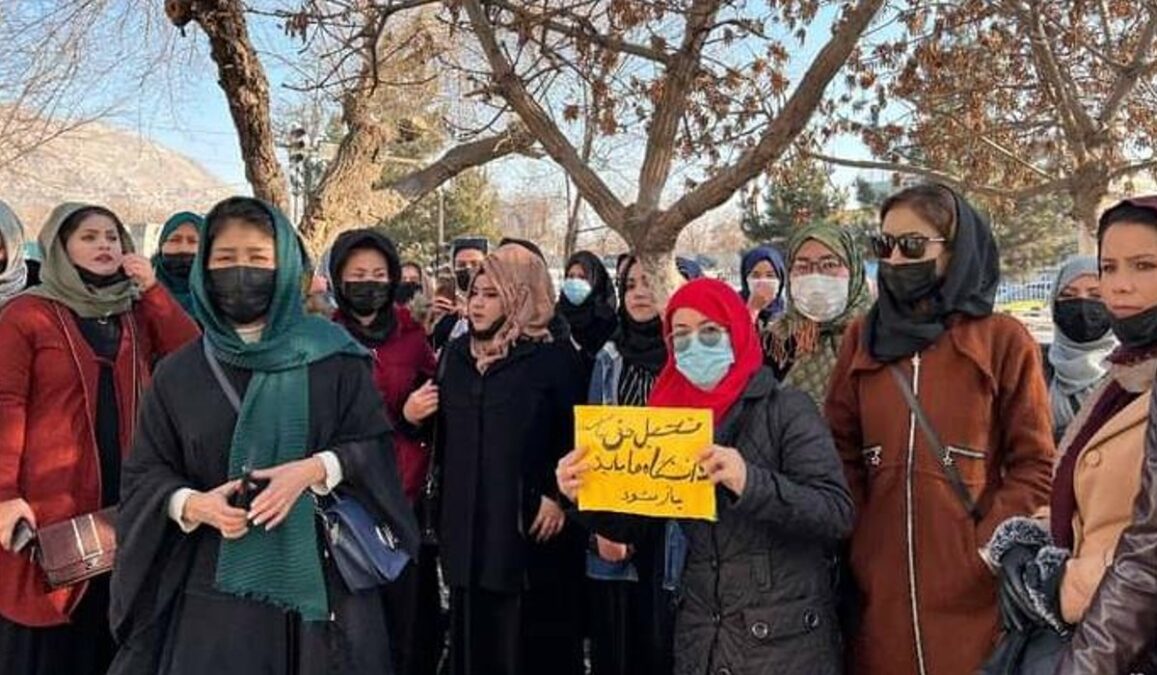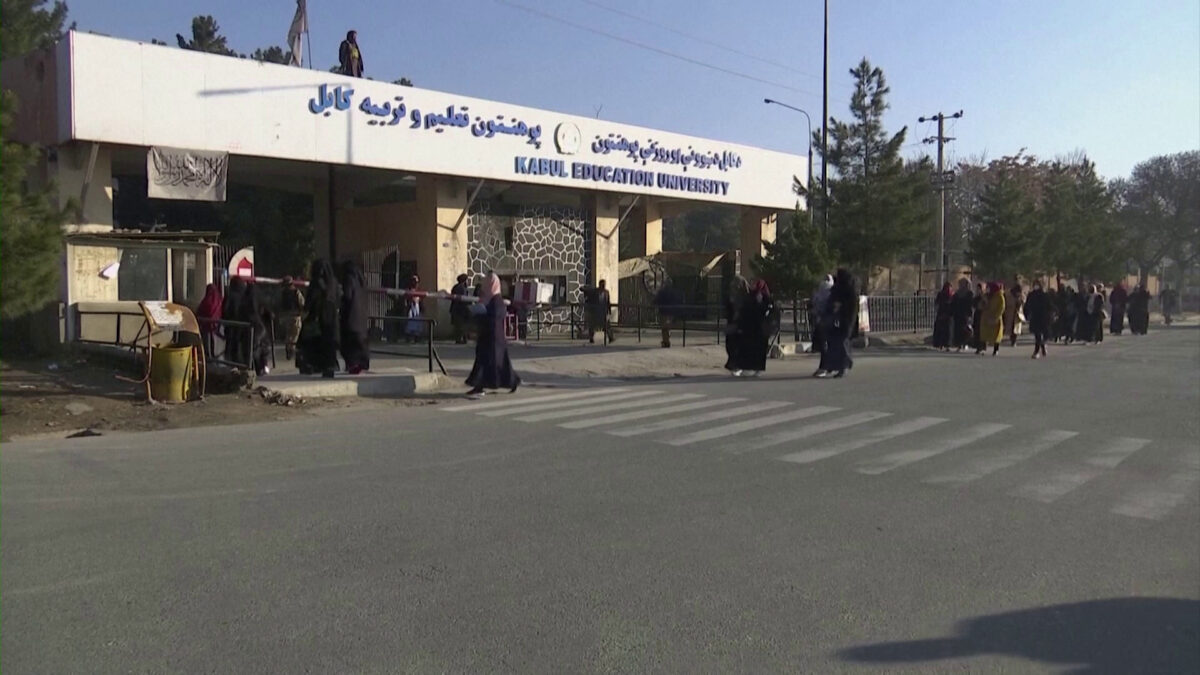Both sides claim they inflicted casualties in skirmishes in the last province to resist Taliban takeover
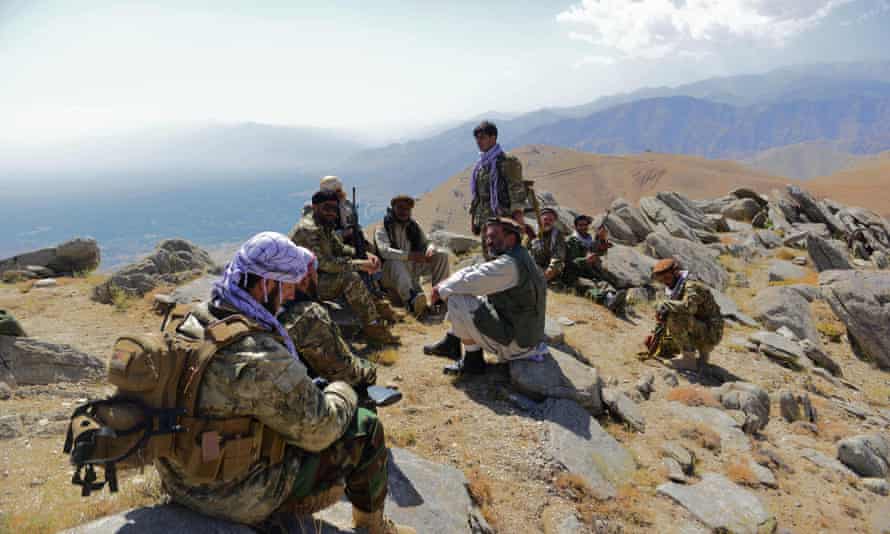
Staff and agencies
Fri 3 Sep 2021
Taliban forces and fighters loyal to local leader Ahmad Massoud battled in Afghanistan’s Panjshir Valley on Thursday, more than two weeks after the Islamist militia seized power, as Taliban leaders in the capital, Kabul, worked to form a government.
Panjshir is the last province resisting rule by the Taliban, who retook control of the country as US and foreign troops withdrew after 20 years of conflict following the September 11 attacks on the United States.
Each side made competing claims about territorial gains and inflicting heavy casualties.
Taliban spokesman Zabihullah Mujahid said: “We started operations after negotiation with the local armed group failed.” Taliban fighters had entered Panjshir and taken control of some territory, he said. “They [the enemy] suffered heavy losses.”
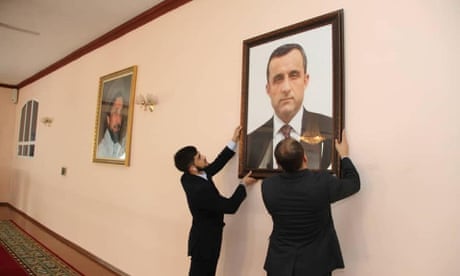
‘Panjshir stands strong’: Afghanistan’s last holdout against the Taliban
A spokesman for the National Resistance Front of Afghanistan (NRFA) rebel grouping said it had full control of all passes and entrances and had driven back efforts to take Shotul district.
“The enemy made multiple attempts to enter Shotul from Jabul-Saraj and failed each time,” he said, referring to a town in neighbouring Parwan province.
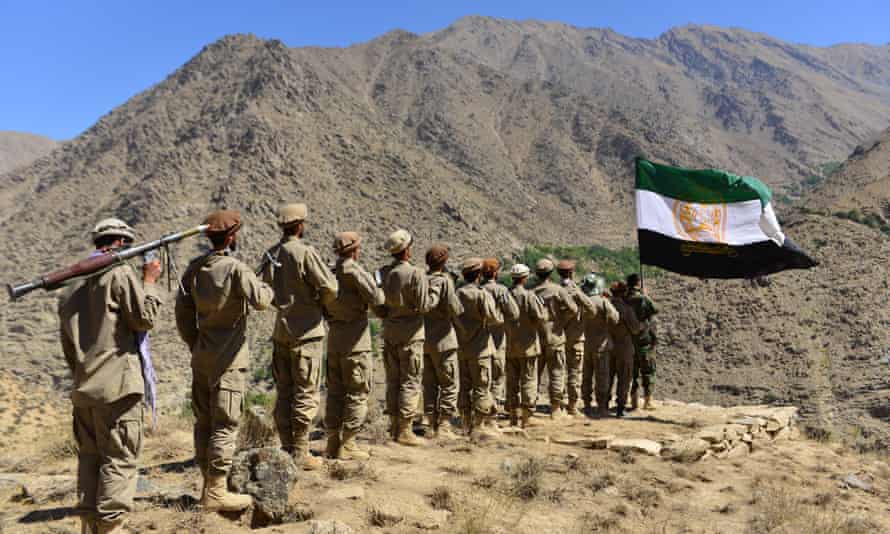
Panjshir valley, north of Kabul in the Hindu Kush, was a resistance stronghold for decades, first against the Soviets in the 1980s, then against the Taliban in the 1990s. It is still dotted with rusting tanks from the fights of those decades.
The vice-president, Amrullah Saleh, who was born and trained to fight there, vowed it would reprise the role of stronghold, after he declared himself “caretaker” head of state after the Taliban takeover.
Afghanistan’s ambassador to Tajikistan, Lt Gen Zahir Aghbar, a former senior security official before becoming an envoy, earlier promised Panjshir would form a base for those who wanted to fight on. “Panjshir stands strong against anyone who wants to enslave people,” he said.
Since the Taliban swept into Kabul on 15 August, several thousand fighters from local militias and remnants of the government’s armed forces have massed in Panjshir under the leadership of Massoud, the son of a former Mujahideen commander.
They have been holding out in the steep valley where attacks from outside are difficult.
Efforts to negotiate a settlement appear to have broken down, with each side blaming the other for the failure.
Mujahid said the announcement of a new government was a few days away, while Taliban official Ahmadullah Muttaqi said a ceremony was being organised at the presidential palace.
The legitimacy of the government in the eyes of international donors and investors will be crucial for the economy as the country battles drought and the ravages of a conflict that killed an estimated 240,000 Afghans.
With Reuters
2 Sep, 2021
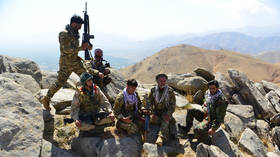
Afghan resistance forces patrol Darband area in Anaba district, Panjshir province, September 1, 2021 © AFP / Ahmad Sahel Arman
The Taliban has claimed its fighters seized a key position at the entrance to the Panjshir valley – the only Afghan province still out of the group’s control. Local resistance has denied the Taliban made any advances.
The Taliban launched a major operation to take the Panjshir valley on Thursday, after the negotiations with the local resistance movement failed, according to spokesman Zabihullah Mujahid. He said the Taliban fighters entered the province and captured eleven “important” positions along the main road leading to the eastern province of Badakhshan. Among them was the town of Shattal in the Parwan province, at the southwestern entrance to the valley.
Representatives of the National Resistance Front (NRF) denied the Taliban made any advances into the valley, however, and claimed they were still in full control of all the passes leading into Panjshir. The Taliban’s “multiple” attempts to enter the area were thwarted, the militia claimed.
“They did not succeed in their offensive and they did not advance even a kilometer,” said Fahim Dashti, a NRF spokesman.
Both sides claimed to have inflicted heavy losses on their enemies, but the claims were impossible to verify independently.
The Taliban’s Mujahid said the fighting started after the talks with the Panjshir militia failed. According to some reports, the Taliban was ready to accept any governor the local militias would appoint but demanded that the flag of the “Islamic Emirate of Afghanistan” be raised over the valley – something the NRF refused to do.
According to Amrullah Saleh, who now styles himself the “acting president” of Afghanistan, the flags of the Islamic Republic – the former, US-backed government – are still flying in Panjshir.
Saleh was the deputy to Ashraf Ghani, the NATO-backed president who fled the country on August 14, as the Taliban approached Kabul, triggering the mad scramble of the US-organized airlift.
The standoff between the Taliban and the Panjshir resistance has been shaping up since then. On August 31, Reuters reported that at least eight Taliban fighters were killed as they tried to move on the NRF positions. The Taliban did not comment on the losses at that time, as the group apparently was still seeking a negotiated solution to the conflict with the militias.
Last week it was reported that local militias in the northern Baghlan province had evicted Taliban members from three districts, only for one to be recaptured soon after. The Taliban now claims to have recaptured all three.
Following the fall of Kabul on Aug. 15, several thousand fighters from local militias and the remnants of army and special forces units have massed in Panjshir.
By REUTERS
SEPTEMBER 3, 2021
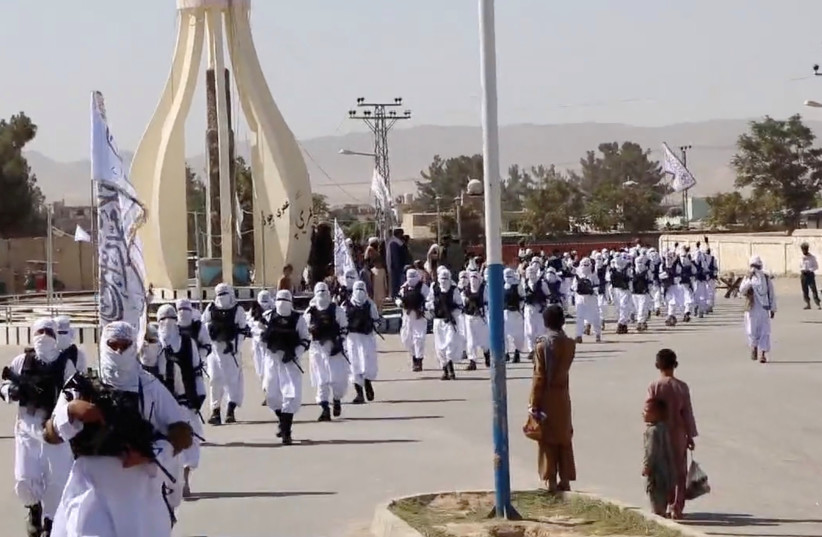
Taliban fighters march in uniforms on the street in Qalat, Zabul Province, Afghanistan, in this still image taken from social media video uploaded August 19, 2021
(photo credit: REUTERS)
Advertisement
Taliban forces and fighters loyal to local leader Ahmad Massoud battled in Afghanistan's Panjshir Valley on Thursday, more than two weeks after the Islamist militia seized power, as Taliban leaders in the capital, Kabul, worked to form a government.
Panjshir is the last province resisting rule by the Taliban, who retook control of the country as US and foreign troops withdrew after 20 years of conflict following the Sept. 11, 2001, attacks on the United States.
Each side said it had inflicted heavy casualties.
"We started operations after negotiation with the local armed group failed," Taliban spokesman Zabihullah Mujahid said.
Taliban fighters had entered Panjshir and taken control of some territory, he said. "They (the enemy) suffered heavy losses."
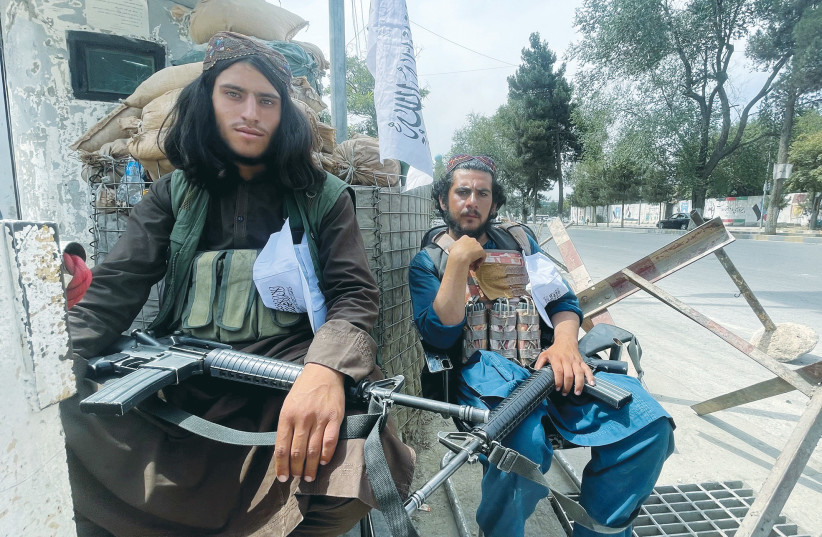
A spokesman for the National Resistance Front of Afghanistan (NRFA) rebel grouping said it had full control of all passes and entrances and had driven back efforts to take Shotul district.
"The enemy made multiple attempts to enter Shotul from Jabul-Saraj, and failed each time," he said, referring to a town in neighboring Parwan province.
Since the Taliban swept into Kabul on Aug. 15, several thousand fighters from local militias and remnants of the government's armed forces have massed in Panjshir under the leadership of Massoud, son of a former Mujahideen commander.
They have been holding out in the steep valley where attacks from outside are difficult.
Efforts to negotiate a settlement appear to have broken down, with each side blaming the other for the failure.
Mujahid said the announcement of a new government was a few days away, while Taliban official Ahmadullah Muttaqi said a ceremony was being organized at the presidential palace.
HUMANITARIAN CATASTROPHE
The legitimacy of the government in the eyes of international donors and investors will be crucial for the economy as the country battles drought and the ravages of a conflict that killed an estimated 240,000 Afghans.
Humanitarian organizations have warned of impending catastrophe and the economy - reliant for years on many millions of dollars of foreign aid - is close to collapse.
Many Afghans were struggling to feed their families amid severe drought well before the Taliban militants seized power and millions may now face starvation with the country isolated and the economy unraveling, aid agencies say.
"Since the 15th of August, we have seen the crisis accelerate and magnify with the imminent economic collapse that is coming this country's way," Mary-Ellen McGroarty, World Food Programme country director in Afghanistan, told Reuters from Kabul.
In a positive development, a senior executive of Western Union Co said it was resuming money-transfer services to Afghanistan - a decision he said was in line with a US push to allow humanitarian activity to continue there.
"Much of our business involving Afghanistan is low-value family and support remittances that support basic needs of the people there, so that's the grounding that we have and why we want to reopen our business," said Jean Claude Farah, Western Union's president in Asia, Europe, the Middle East and Africa.
Western Union and MoneyGram International Inc had suspended services in Afghanistan after the Taliban captured Kabul.
RECOGNITION
The Taliban enforced a radical form of sharia, or Islamic law, when it ruled from 1996-2001 but have tried to present a more moderate face to the world this time, promising to protect human rights and refrain from reprisals against old enemies.
The United States, the European Union and others have cast doubt on such assurances, saying formal recognition of the new government - and the economic aid that would flow from that - is contingent on action.
German Foreign Minister Heiko Maas said on Thursday that Germany was ready to resume a diplomatic presence in Kabul if the Taliban met certain conditions.
"We want to see an inclusive government (in Kabul), the respect for fundamental human and women's rights - and Afghanistan must not again become a breeding ground for international terrorism," Maas told reporters in Slovenia, where he met his EU counterparts to discuss Afghanistan.
French Foreign Minister Jean-Yves Le Drian told Le Figaro newspaper that Paris had yet to see positive signals the group had changed.
A source with direct knowledge of the move said Afghan diplomats had been asked to stay in overseas posts for the time being. The Taliban wanted to maintain a sense of continuity, the source said.
The Taliban have promised safe passage out of the country for any foreigners or Afghans left behind by the huge airlift that ended when US troops withdrew on Monday. But with Kabul airport still closed, many were seeking to flee over land.
Thousands of Afghans - some with no documentation or pending US visa applications, others in families with mixed immigration statuses - are also waiting in "transit hubs" in third countries following the chaotic scramble to evacuate.
Issued on: 03/09/2021 -

Text by: FRANCE 24
Video by: FRANCE 24
Anti-Taliban resistance fighters loyal to local leader Ahmad Massoud claimed they have full control of the passes into their stronghod Panjshir Valley following clashes against the Taliban on Thursday, more than two weeks after the Islamist militia swept into the captial, Kabul. But the Taliban claimed they inflicted heavy casualties in the battle.
A spokesman for the National Resistance Front (NRF) comprising anti-Taliban militia fighters and former Afghan security forces said the movement had full control of all the passes and entrances into the Panjshir Valley and had driven back Taliban efforts to take Shotul district.
"The enemy made multiple attempts to enter Shotul from Jabul-Saraj, and failed each time," he said, referring to a town in neighbouring Parwan province.
Surrounded by towering snow-capped mountains, the rugged Panjshir Valley, which begins around 80 kilometres (50 miles) north of the capital Kabul, is a stronghold of resistance after the Taliban swept into Kabul on August 15 and seized power.
But the Taliban also said it had inflicted heavy casualties on the NRF.
"We started operations after negotiation with the local armed group failed," Taliban spokesman Zabihullah Mujahid said Thursday.
Since August 15, several thousand fighters from local militias and remnants of the government's armed forces have massed in Panjshir under the leadership of Massoud, son of the Afghan resistance hero, Ahmad Shah Massoud.
Efforts to negotiate a settlement appear to have broken down, with each side blaming the other for the failure.
Anti-Taliban leader Massoud wants to talk but ready to fight

01:40
(FRANCE 24 with AFP and REUTERS)
By Sadaf Shinwari / in Afghanistan / on Friday, 03 Sep 2021 1

Islamic Emirate of Afghanistan claims to have captured the Shutul district of Panjshir province but resistance forces have denied the claim.
Acting minister of culture and information and spokesperson of the Taliban, Zabiullah Mujahid said that eleven outposts have also been taken and over 30 resistance forces have been killed.
Meanwhile, unconfirmed reports by the Taliban read that the districts of Paryan and Onaba districts of the province have also been taken.
It has been the fourth day since the heavy conflicts erupted in Panjshir province between the resistance forces of the province and the Taliban.
A spokesperson of resistance forces Fahim Dashti in a voice clip denied the capture of Shutul district and claimed to have driven back the Taliban fighters in the district.
Dashti claimed that tens of dead bodies of the Taliban fighters are left on the ground and the latter asked tribal elders of Parwan province to mediate and let them take their dead bodies.
Pictures leaked from the Panjshir province show that the fighters in Panjshir province are using rocket launchers, missiles, and other weapons from the era of the Soviet Union.
The resistance forces also claim to have killed 350 Taliban fighters and wounded 290 more.
The heavy and deadly fight between the warring sides erupted after peace negotiations between the two sides failed.
The anti-Taliban resistance movement is growing in Afghanistan, but experts aren't convinced they can retake the country

The National Resistance Front of Afghanistan, also known as the Panjshir resistance, has been making waves after seven Taliban fighters were killed attempting to enter the Panjshir valley earlier this week.
The military group, comprised of former Northern Alliance and anti-Taliban fighters, was formed in August after the Taliban overtook Afghanistan in a stunning week-long rout that saw seven people die rushing to the tarmac of Kabul's international airport in a desperate bid to escape.
The NRF is run by Ahmad Massoud, son of a former Mujahideen commander and former Afghanistan vice-president Amrullah Saleh.
Read more: ‘We need your solidarity’: What the Taliban takeover means for Afghanistan’s women and girls
On Wednesday, the Taliban said it had the group surrounded and called on them to negotiate a settlement. According to experts, no resistance movement inside the country stands much of a chance.
"I don't think there will be successful anti-Taliban resistance movement at all," said, Erika Simpson, president of the Canadian Peace Research Association.
U.S. President Joe Biden announced he would begin withdrawing American troops from Afghanistan in April. The U.S. flew its last soldier out on Aug. 30, ending the country's longest war that spanned two decades.
When the U.S. began withdrawing its troops, Simpson said the U.S. withdrew equipment that helped support the Afghan National Defence Forces, which helped prevent the resistance from fighting a high technology war.
But Simpson, who is also an associate professor of international relations with Western University, said this could have actually given the Taliban, which are typically a low-technology group, an edge.
If an anti-Taliban resistance movement is to pick up speed, Simpson debated whether they would have enough arms to topple the Taliban.
"Who would arm them?" she said. "Who would risk it?"
Video: Learn how UNICEF is helping women and children in Afghanistan
She added that any real resistance would likely come from the hundreds of thousands of refugees who will eventually fight to return to their homes and dismantle the organization that displaced them.
Simpson said it would be smarter to "forget" about trying to arm resistance movements in Afghanistan, and focus on the "resistance movement" happening outside.
Adding to that, Aurel Braun, an international relations and political science professor at the University of Toronto, said even if the NRF have some equipment, they would be desperately short of food, medicine and weapons — "and I don't see how that would be provided to them."
Afghanistan is a landlocked country, meaning it is surrounded by land but no oceans, making it difficult to trade. The country also shares borders with Iran, Pakistan, Tajikistan, Turkmenistan, and Uzbekistan, which Braun said would make airlifting supplies "a very difficult task" for Afghanistan.
Even resistance in the form of ongoing protest in Afghanistan may be futile, Nader Hashemi, director of the Center for Middle East Studies at the University of Denver.
Read more: Hunger crisis looms in Afghanistan under new Taliban regime
"The Taliban is not known for its toleration and moderation," Hashemi said.
He added Afghan women, who have been at the centre of protests demanding gender equality rights throughout the country, will likely be "repressed very severely, in the way that the Taliban have done in the past."
The Taliban are in power. What's next?
What comes next for Afghanistan appears to be a series of hardships, in-fighting and financial woes.
Politically, the Taliban may have to deal with challengers such as ISIS-K, who claimed responsibility for a suicide bombing last week that killed 182 people including 13 U.S. service members at Kabul's international airport.
ISIS-K is an extremist organization at war with the Taliban, comprised mainly of disgruntled Taliban members, radical extremists from neighbouring countries and leftover remnants of ISIS in Iraq and Syria.
It's much more extreme, much more radical," Hashemi said.
"If (the Taliban) wants the type of diplomatic recognition and engagement with the international community that it's been talking about over the last couple of weeks, it will be dependent on them being able to control the territory of Afghanistan, including controlling and preventing ISIS-K from manifesting itself, from attacking other targets, whether they're in Afghanistan or a part of Afghanistan."
Shortly after the Taliban took control of Kabul on Aug. 15, Afghanistan's president Ashraf Ghani fled the country to the United Arab Emirates. Afghanistan’s ambassador to Tajikistan has since accused Ghani of stealing $169 million from state coffers, while the Russian Embassy claimed he'd escaped with four cars and a helicopter full of cash.
But Simpson said his return is unlikely.
"Ashraf Ghani has no legitimacy or credibility to organize a government in waiting outside Afghanistan. No legitimacy or credibility. People will spit on his grave," she said.
Simpson also noted that anyone hoping to see the formation of a coalition government may be waiting a long time.
The National Coalition of Afghanistan party is led by Abdullah Abdullah, Afghanistan's former foreign minister, while former Afghan president Hamid Karzai is also angling for a political role. Simpson said the pair could try to form a coalition with the Taliban but "they don't have any leverage. They don't have any bargaining power."
In the meantime, the Taliban are pushing for international recognition as the country's official government from the West. Braun said this is to secure aid from the U.S., which the Taliban will need if they hope to stabilize Afghanistan's economy without significantly increasing taxes.
Read more: With Kabul airport closed, Afghans fearful of Taliban reprisals rush for borders
According to the World Bank, Afghanistan is one of the world's top receivers per country of financial aid, rivalled only by Syria, Ethiopia, Bangladesh and Yemen. In 2019, the World Bank said Afghanistan received more than $4.2 billion in international aid, while the country's GDP remained just over $19.2 billion.
"Foreign aid was crucial in keeping the Afghan economy alive and so they would like to maintain that," he said.
But for residents who remain in Afghanistan -- particularly women and girls -- Braun predicted "desperation."
Braun pointed to emerging reports of residents taking dangerous routes to leave Afghanistan now that Kabul's airports have closed. There has also been an increase in food insecurity with more people being prohibited from going to work and school, particularly in households where women are the breadwinners.
"Women have been forced to stay at home (from work)," he said. "Once they run out of supplies -- ordinary things, household goods and so on, that's going to be a huge, huge problem."
The Taliban so far has publicly promised "amnesty" for anyone who fought against them and have said they would allow women to return to work.
But Hashemi said he is "deeply skeptical," given the Taliban's prior track record, which saw women barred from working or attending school, forced marriages and banned women from leaving their homes without a male escort.
In addition to this, Hashemi said the country is expected to suffer a massive "brain drain" as educated women, along with interpreters and Western administration staff and their families flee the country in droves.
As a result of U.S. military intervention, Hashemi said a "civil society" was formed. "Millions of Afghan girls and women were able to go to school."
"There was an intellectual class that emerged," he said. "Unfortunately, most of that international class has now fled."
— with files from the Associated Press


